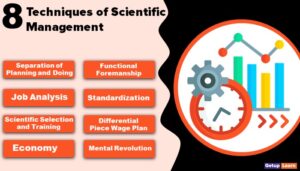Table of Contents
What is Evolution of Management Theory?
The practice of management is as old as human civilization. The ancient civilizations of Egypt the great pyramids), Greece (the leadership and war tactics of Alexander the Great) and Rome displayed marvellous results of good management practices. The origin of management as a discipline was developed in the late 19th century.
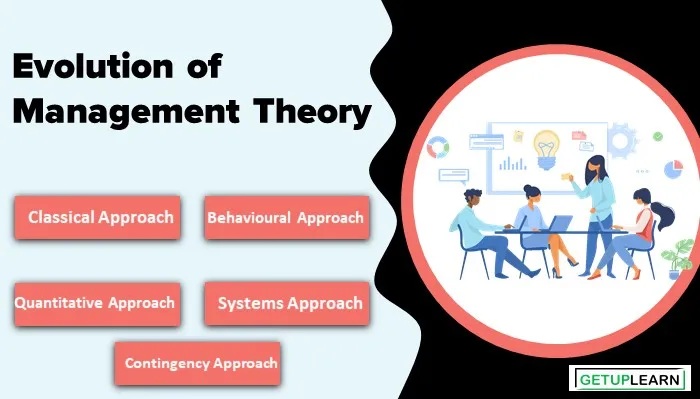
Over time, management thinkers have sought ways to organize and classify the voluminous information about management that has been collected and disseminated. These attempts at classification have resulted in the identification of management approaches.
The approaches of management are theoretical frameworks for the study of leadership. Each of the management approaches is based on somewhat different assumptions about human beings and the organizations for which they work.
Evolution of Management Theory
The following different approaches of management are:
- The Classical Approach
- The Behavioural Approach
- The Quantitative Approach
- Systems Approach
- Contingency Approach
The formal study of management is largely a twentieth-century phenomenon, and to some degree, the relatively large number of management approaches reflects a lack of consensus among management scholars about basic questions of theory and practice.
The Classical Approach
The classical approach is the oldest formal approach of management thought. Its roots pre-date the twentieth century. The classical approach of thought generally concerns ways to manage work and organizations more efficiently. Three areas of study that can be grouped under the classical approach are:
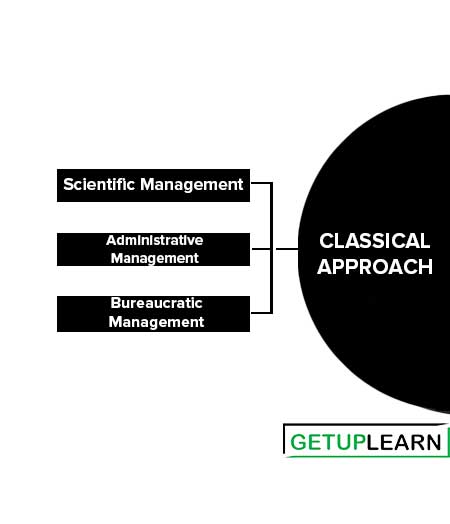
Scientific Management
Frederick Winslow Taylor was an American mechanical engineer who sought to improve industrial efficiency. He was one of the first management consultants. Taylor was one of the intellectual leaders of the Efficiency Movement and his ideas, broadly conceived, was highly influential in the Progressive Era (the 1890s – 1920s). Taylor summed up his efficiency techniques in his 1911 book The Principles of Scientific Management, which in 2001 Fellows of the Academy of Management voted the most influential management book of the twentieth century.
His pioneering work in applying engineering principles to the work done on the factory floor was instrumental in the creation and development of the branch of engineering that is now known as industrial engineering. Taylor made his name in, and was most proud of his work in, scientific management; however, he made his fortune patenting steel-process improvements.
The scientific method consists essentially of (a) Observation, (b) Measurement, (c) Experimentation and (d) Inference. He advocated thorough planning of the job by the management and emphasized the necessity of perfect understanding and cooperation between the management and the workers both for the enlargement of profits and the use of scientific investigation and knowledge in industrial work.
He summed up his approach in these words: Science, not the rule of thumb, Harmony, not discord, Cooperation, not individualism, Maximum output, in place of restricted output and the development of each man to his greatest efficiency and prosperity.
Administrative Management
Administrative management focuses on the management process and principles of management. In contrast to scientific management, which deals largely with jobs and works at the individual level of analysis, administrative management provides a more general theory of management.
Henry Fayol is the major contributor to this approach of management thought. The Principles of Management are the essential, underlying factors that form the foundations of successful management. According to Henri Fayol in his book General and Industrial Management (1916), there are fourteen ‘Principles of Management.
Bureaucratic Management
Bureaucratic management focuses on the ideal form of organization. Max Weber was a major contributor to bureaucratic management. Based on observation, Weber concluded that many early organizations were inefficiently managed, with decisions based on personal relationships and loyalty.
He proposed that a form of organization, called a bureaucracy, characterized by division of labour, hierarchy, formalized rules, impersonality, and the selection and promotion of employees based on ability, would lead to more efficient management. Weber also contended that managers’ authority in an organization should be based not on tradition or charisma but on the position held by managers in the organizational hierarchy.
The Behavioural Approach
The behavioural approach of management thought developed, in part, because of perceived weaknesses in the assumptions of the classical approach. The classical approach emphasized efficiency, process, and principles. Some felt that this emphasis disregarded important aspects of organizational life, particularly as it related to human behaviour. Thus, the behavioural approach focused on trying to understand the factors that affect human behaviour at work.
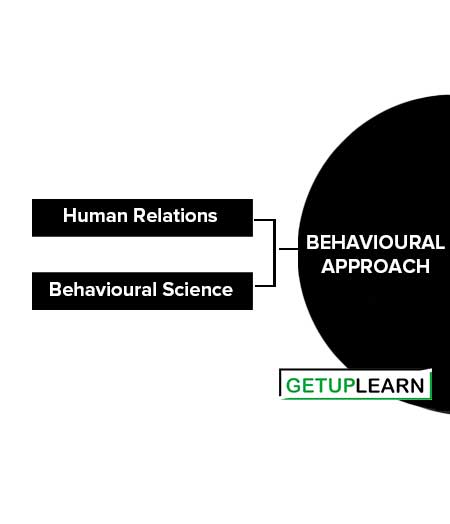
Human Relations
The Hawthorne Experiments began in 1924 and continued through the early 1930s. A variety of researchers participated in the studies, including Elton Mayo. One of the major conclusions of the Hawthorne studies was that workers’ attitudes are associated with productivity.
Another was that the workplace is a social system and informal group influence could exert a powerful effect on individual behaviour. A third was that the style of supervision is an important factor in increasing workers’ job satisfaction.
Behavioural Science
Behavioural science and the study of organizational behaviour emerged in the 1950s and 1960s. The behavioural science approach was a natural progression of the human relations movement. It focused on applying conceptual and analytical tools to the problem of understanding and predicting behaviour in the workplace.
The behavioural science approach has contributed to the study of management through its focus on personality, attitudes, values, motivation, group behaviour, leadership, communication, and conflict, among other issues.
The Quantitative Approach
The quantitative approach focuses on improving decision-making via the application of quantitative techniques. Its roots can be traced back to scientific management.
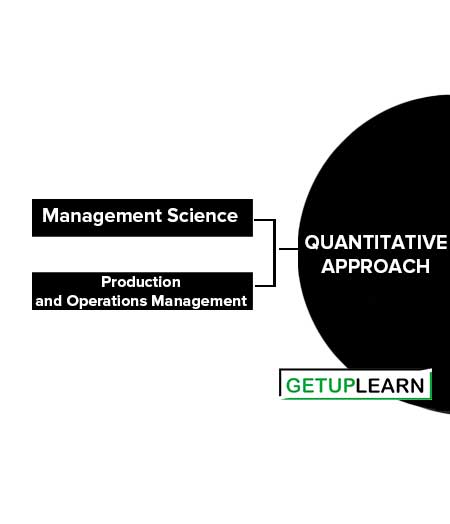
Management Science (Operations Research)
Management science (also called operations research) uses mathematical and statistical approaches to solve management problems. It developed during World War II as strategists tried to apply scientific knowledge and methods to the complex problems of war.
The industry began to apply management science after the war. The advent of the computer made many management science tools and concepts more practical for industry.
Production and Operations Management
This approach focuses on the operation and control of the production process that transforms resources into finished goods and services. It has its roots in scientific management but became an identifiable area of management study after World War II.
It uses many of the tools of management science. Operations management emphasizes the productivity and quality of both manufacturing and service organizations. W. Edwards Deming exerted a tremendous influence in shaping modern ideas about improving productivity and quality.
Major areas of study within operations management include capacity planning, facilities location, facilities layout, materials requirement planning, scheduling, purchasing and inventory control, quality control, computer-integrated manufacturing, just–in–time inventory systems, and flexible manufacturing systems.
Systems Approach
The systems approach focuses on understanding the organization as an open system that transforms inputs into outputs. The systems approach began to have a strong impact on management thought in the 1960s as a way of thinking about managing techniques that would allow managers to relate different specialities and parts of the company to one another, as well as to external environmental factors.
The systems approach focuses on the organization as a whole, its interaction with the environment, and its need to achieve equilibrium.
Contingency Approach
The contingency approach focuses on applying management principles and processes as dictated by the unique characteristics of each situation. It emphasizes that there is no one best way to manage and that it depends on various situational factors, such as the external environment, technology, organizational characteristics, characteristics of the manager, and characteristics of the subordinates.
Contingency theorists often implicitly or explicitly criticize the classical approach for its emphasis on the universality of management principles; however, most classical writers recognized the need to consider aspects of the situation when applying management principles.
Different Types of Management Theories
These are the different types of management theories:
| Management Approaches | Beginning Dates | Emphasis |
|---|---|---|
| Classical Approach: | ||
| Scientific Management | 1880s | Traditional rules of thumb are replaced by precise procedures developed after careful study of an individual at work. |
| Administrative Management | 1940s | Gives ideas about the primary functions of management and The Fourteen Principles of Administration. |
| Bureaucratic Management | 1920s | Replaces traditional leadership and charismatic leadership with legal leadership. |
| Behavioural Approach: | ||
| Human Relations | 1930s | Workers’ attitudes are associated with productivity. |
| Behavioral Science | 1950s | Gives ideas to understand human behaviour in the organization. |
| Quantitative Approach: | ||
| Management Science (Operation research) | 1940s | Uses mathematical and statistical approaches to solve management problems. |
| Production and Operations Management | 1940s | This approach focuses on the operation and control of the production process that transforms resources into finished goods and services. |
| Recent Developments: | ||
| Systems Approach | 1950s | Considers the organization as a system that transforms inputs into outputs while in constant interaction with its environment. |
| Contingency Approach | 1960s | Applies management principles and processes as dictated by the unique characteristics of each situation. |
What are the classical approaches to management?
The classical approach is the oldest formal approach of management thought. Its roots pre-date the twentieth century. The classical approach of thought generally concerns ways to manage work and organizations more efficiently. Three areas of study that can be grouped under the classical approach are:
1. Scientific Management
2. Administrative Management
3. Bureaucratic Management.
What is behavioural approach?
The behavioural approach of management thought developed, in part, because of perceived weaknesses in the assumptions of the classical approach. The classical approach emphasized efficiency, process, and principles. Some felt that this emphasis disregarded important aspects of organizational life, particularly as it related to human behaviour.








